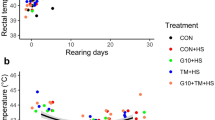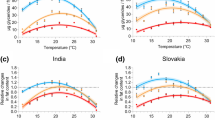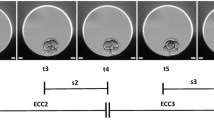Abstract
THE effect of temperature on the incubation period of poikilothermic animals is usually considered in terms of constant or uniformly fluctuating temperature. Under constant conditions the rate of development is slightly less at the maximum temperature which permits hatching than at slightly lower temperatures. In an attempt to elucidate the factors involved in this lengthening of the embryonic period, developing eggs of Tribolium confusum Duval were exposed to high temperatures for brief periods during their development. Although the data obtained show considerable variation, periods of increased susceptibility were evident.
This is a preview of subscription content, access via your institution
Access options
Subscribe to this journal
Receive 51 print issues and online access
$199.00 per year
only $3.90 per issue
Buy this article
- Purchase on Springer Link
- Instant access to full article PDF
Prices may be subject to local taxes which are calculated during checkout
Similar content being viewed by others
References
Stanley, M. S. M., thesis, University of Utah, 208 (unpublished).
Browning, T. O., Austral. J. Sci. Res., B, 5 91 (1952).
Author information
Authors and Affiliations
Rights and permissions
About this article
Cite this article
STANLEY, M., GRUNDMANN, A. Heat Sensitivity of Developing Embryos of Tribolium confusum. Nature 212, 737–738 (1966). https://doi.org/10.1038/212737a0
Issue Date:
DOI: https://doi.org/10.1038/212737a0
Comments
By submitting a comment you agree to abide by our Terms and Community Guidelines. If you find something abusive or that does not comply with our terms or guidelines please flag it as inappropriate.



